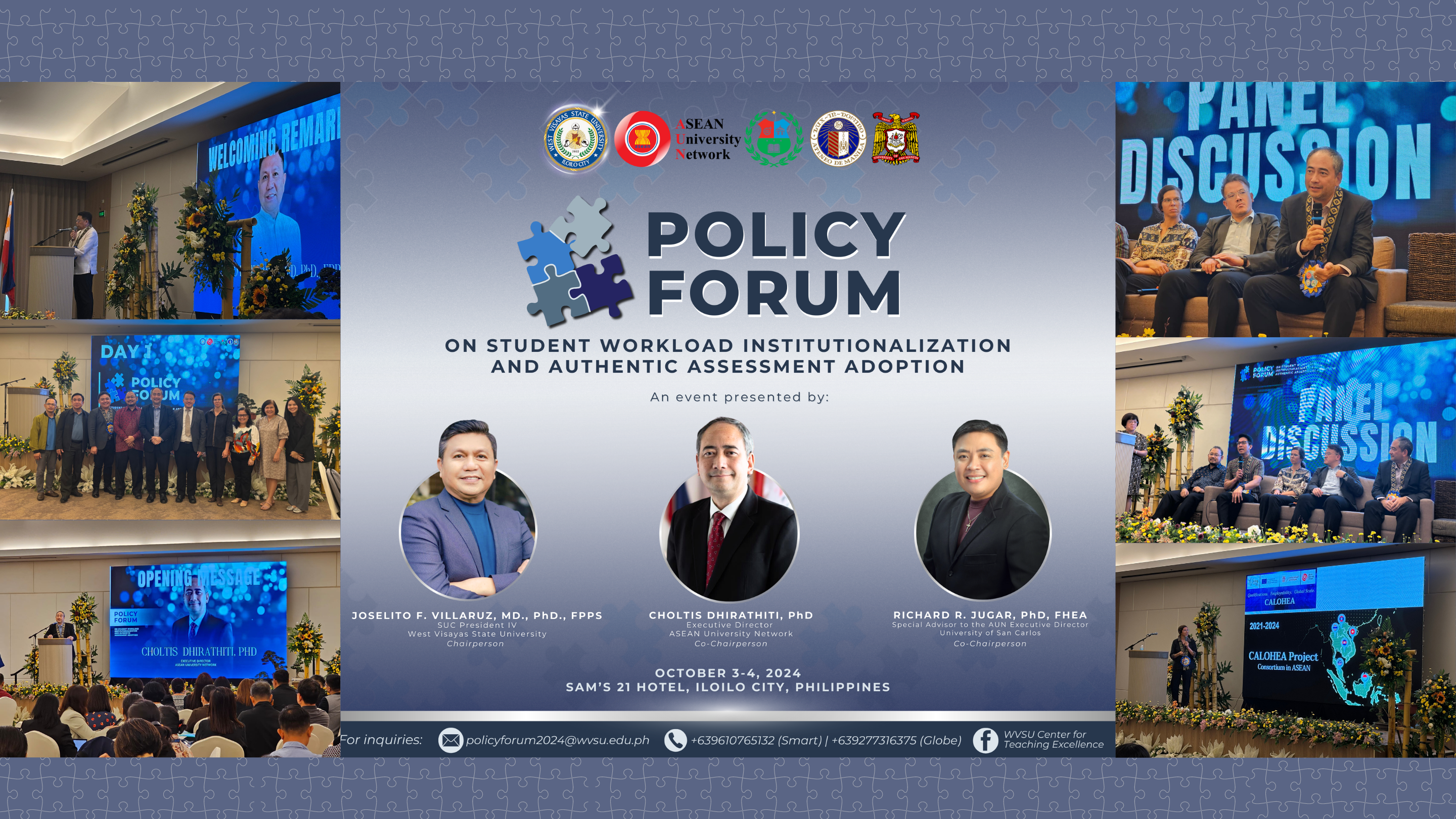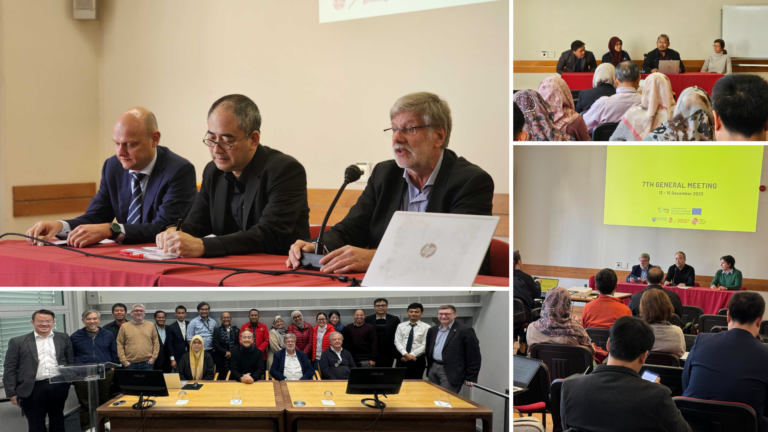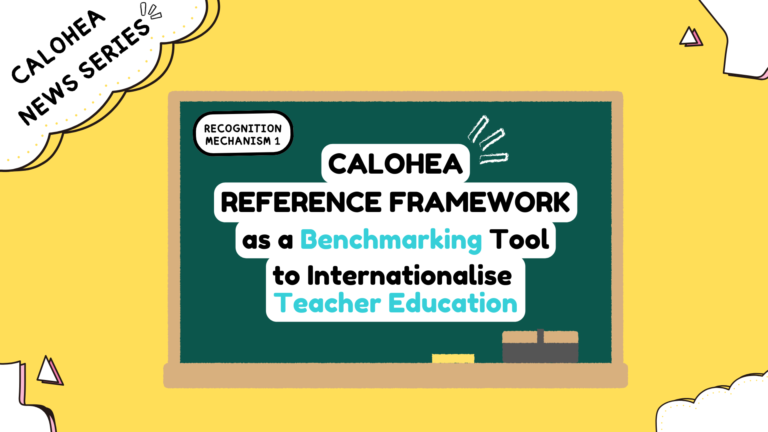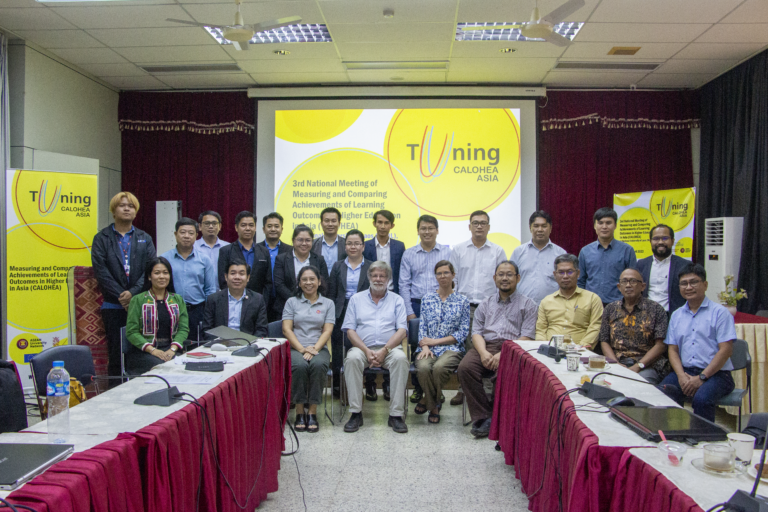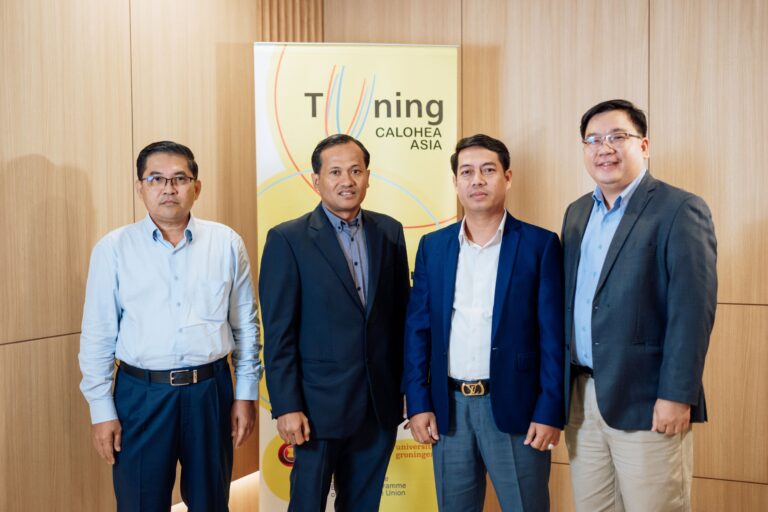Policy Forum 2024 in Iloilo, the Philippines, highlights Student Workload Measurement and Authentic Assessment As Qualifications Drivers towards Educational Excellence of Philippine HEIs
The “Measuring and Comparing Achievements of Learning Outcomes in Higher Education in Asia”, or the CALOHEA Project, concluded in July 2024 after its 8th General Meeting. The project’s ending ushers a new chapter in promoting the efforts towards higher education qualifications transformation movement in the ASEAN region; participating institutions are now sharing and utilising the knowledge and mechanisms learnt from the projects in elevating and internationalising the curriculum design and qualifications of their own institutions.
On 3-4 October 2024, West Visayas State University (WVSU) in collaboration with he University of San Carlos (USC) and the AUN Secretariat, organised the Policy Forum on the Institutionalisation and Standardisation of Student Workload (RM2) and Adoption of Authentic Assessment (RM3). This forum was held with the aim of introducing the project’s key results mechanism to higher education institutions in the Philippines and encouraging them to utilise the key results with focus on student workload (RM2) and Authentic Assessment (RM3) in transforming curricula design and qualifications as a part of the efforts towards global education excellence.
The forum gained the attendance of 168 participants from 56 universities from Luzon, Mindanao and Visayas regions of the Philippines.
(Day 1) Opening Ceremony
Dr. Joselito F. Villaruz, President of WVSU, opened the forum by first warmly welcoming all the speakers, CALOHEA experts, and the participants from universities across the country to the forum. The president underscored the commitment in continuously improving the quality of curricula through authentic assessments, highlighting the critical importance of internationalisation of HEIs in the Philippines.
In this regard, Dr.. Villaruz also highlighted the three key recognition mechanisms – the key results from the CALOHEA project – as guiding solutions in addressing the complex challenges of analysing, assessing, and developing curricula across various study programmes. Based on the university’s participation in the project, it allowed WVSU and other participating universities the opportunity to learn and share the insights on these mechanisms and their impact on the modernisation of higher education in Southeast Asia.
Next on the stage was Dr. Choltis Dhirathiti, AUN Executive Director, who highlighted the importance and AUN’s involvement and support on the utilisation of student workload standardisation and authentic assessment adoption as tools for regional higher education development, interregional cooperation, and internationalisation.
Dr. Cherrie Melanie Ancheta-Diego, Director IV, Office of Programs and Standards Development (OPSD), the Philippines’ Commission on Higher Education, in her keynote video message highlighted how the focus of the forum on mechanisms towards global education excellence aligns to CHED’s internationalisation efforts and initiatives as well as the implication on the quality of Philippine Higher Education.
In conclusion of the opening ceremony, Dr. Richard Jugar from the University of San Carlos, and Special Advisor to the AUN Executive Director (Teacher Education), shared with the floor the rationale of the forum.
Plenary Session: Qualifications Transformations, CALOHEA, and Applications in the Context of ASEAN and the Philippines
Following the opening ceremony, the informative sessions kickstarted with the introduction to the project that serves as the foundation for the dialogue on this forum – the CALOHEA project. Invited to the stage was Dr. Maria Yarosh, European Expert and the project’s coordinator from the University of Groningen, who introduced the participants to the background of the project. Dr. Yarosh traced back the project as the continuation of the Tuning-Academy South East (TASE) project with the focus on developing and introducing transformative qualifications tools through the Tuning methodology. In this regard, she emphasised the utilisation of the Tuning Methodology in different contexts as well as the European Union higher education landscape benefited from a similar methodology. In the end, Dr. Yarosh provided an overview of the three Key Recognition Mechanisms resulting from the CALOHEA project as well as their applications in the context of the Philippines’ higher education as well as that of ASEAN as a region.
Coming up next was Dr. Muhamad Saiful Bahri Yusoff, Director of the Centre for the Development of Academic Excellence at Universiti Sains Malaysia as well as the Subject-Area Group (SAG) Coordinator in Medicine of the CALOHEA project. His presentation is based on his experience collaborating with the CALOHEA project, focusing on the Medicine subject area but also ranging to Teacher Education and Civil Engineering – the two other areas – as well. In this regard, Dr. Saiful also shared with the floor how the mechanisms of the project have been making an impact and are currently being implemented in promoting educational excellence in Malaysian higher education through qualifications transformation.
To keep the momentum going, the next speaker was Mr. Korn Ratanagosoom, First Officer and Chief Strategy of the AUN Secretariat. Mr. Ratanagosoom revisited the role of the AUN Secretariat as the co-coordinator for the project. He also provided an overview of the project’s past achievements in introducing and disseminating the CALOHEA framework and mechanisms in the region, focusing on the reach of the project and its relevance to the Roadmap on the ASEAN Higher Education Space 2025, the ASEAN Work Plan on 2021-2025, UNESCO Global Convention on the Recognition of Qualifications In Higher Education, UN Sustainable Development Goals, and ASEAN Qualifications Reference Framework.
The plenary session ended with the perspectives from the country’s higher education policymakers. Ms. Jesusa Rocel S. Estanislao, Senior Education Program Specialist ASEAN Desk Officer – CHED International Affairs Service (IAS), presented on behalf of Atty. Lily Freida C. Macabangun-Milla – CESO III, Director IV, CHED IAS, to the floor the direction and projects set out by CHED in internationalising Philippine Higher Education. In reference to CALOHEA as well as the ongoing discussion, Ms. Estanislao highlighted how the forum could shed light on both the advantages and the challenges, and how the current initiative focused on student workload standardisation and authentic assessment adoption could contribute to the current and future programmes, projects and initiatives in driving forward the quality of education for Philippine HEIs through qualifications transformation.
Discussion on Curriculum Design and Authentic Assessment
Following the plenary session, the forum embarked into the portion of the programme led by Dr. Richard Jugar. The session focused on engaging the forum participants with the concepts of Syllabus-based Estimation and Course-Tiering through group exercises and discussions. In the Authentic Assessment (Re)Development Plan activity, the participants were asked to put the knowledge they learned about authentic assessment into use through an exercise with guidance from the facilitator.
Ms. Lynette Alcala from WVSU, as the activity facilitator, ended the session by synthesising the insight and key points discussed throughout the session to the forum participants.
(Day 2) Sharing of Exemplary Authentic Assessment Applications in the Philippines
The second day of the forum on 4 October 2024 began with the sharing of how CALOHEA Key Recognition Mechanisms can be applied in the context of Philippine higher education through experiences from WVSU, USC and USA – two Philippine universities participating in the CALOHEA project. This session was featured with Mariter Malonjao from USC, Dr. Alona M. Belarga from WVSU, Dr. James Pedregosa from USA. Each speaker discussed their experience of adopting the student workload standardisation and authentic assessment adoption in their own institution,highlighting both enabling factors and challenges encountered. They also offered their perspectives on future directions on how their respective institutions plan to proceed with the implementation of the mechanisms.
Ma. Asuncion Christine V. Dequilla, PhD, shifted the dialogue towards the adoption of student workload standardisation and authentic assessment from university top management and administrator perspective. She discussed WVSU’s initiative on how to fully implement both student workload standardisation and authentic assessment adoption. This is on the lens of the management and top institutional administrators. Her presentation related the implication/connection of the initiative to the different aspects of higher education such as instruction, extension, research, production and internationalisation with the work and progress of WVSU as the grounding exemplar, drawing also from the examples from the previous speakers.
The afternoon session of Day 2 continued the forum in a panel discussion format, featuring speakers from the keynote session and the plenary session on Day 1: Dr. Edison Fermin, Chairperson of Technical Panel for Teacher Education (TPTE), CHED, Cherrie Melanie Ancheta-Diego, Dr. Choltis Dhirathiti, Dr. Maria Yarosh, Dr. Muhamad Saiful Bahri Yusoff, and Mr. Korn Ratanagosoom. Dr. Richard Jugar served as the moderator for the panel discussion.
In this insightful panel discussion, the panellists offered their insights and perspectives on essential topics related to effective student workload standardisation and authentic assessment. Topics discussed ranged from (1) the current sole measurement of contact hours; (2) student workload and learners’ well-being; (3) the role of academic and student support considering workload standardisation, (4) disparity of estimation between students and academics, (5) unclear workload allocation for experiential learning components of program, (6) consideration of student workload in the design and delivery of degree programs; (7) student workload as the main currency of internationalisation; (8) Internationally comparable authentic assessments as a tool for ensuring equivalency, and (9) possible consideration of student workload standardisation and authentic assessment as an integral element of quality assurance.
At the end of the panel discussion, the floor was open for the panellists to take questions and discuss with the participants on the dialogue topics with Hilda C. Montaño as the Moderator. This was followed by the synthesis session by Dr. Venus P. Diaz who recapped all the key points and highlights discussed throughout the forum. Representatives from all over the Philippines were encouraged to learn more about the key Recognition Mechanisms and how their institutions can benefit from implementing them as part towards educational excellence. With that, the Policy Forum on the Institutionalization and Standardisation of Student Workload (RM2) and Adoption of Authentic Assessment (RM3) came to a successful conclusion.
The process towards global educational excellence is never-ending. Qualifications of curriculum and student learning outcomes serve among the key instruments in allowing for HEIs to continuously adapt and improve to both challenges and opportunities at regional and global levels. As evident throughout this forum, it is heartening to see the enthusiasm and keen interest from Philippine HEIs in exploring and adopting the key recognition frameworks resulting from the CALOHEA project to help accelerate the process in reshaping the country’s higher education landscape. As the CALOHEA initiative and its participating institutions continue to make impact, introduce and implement the key recognition mechanisms across the ASEAN region, we will continue to support these collaborative endeavours to internationalise and elevate the quality of education in the region’s higher education sector.
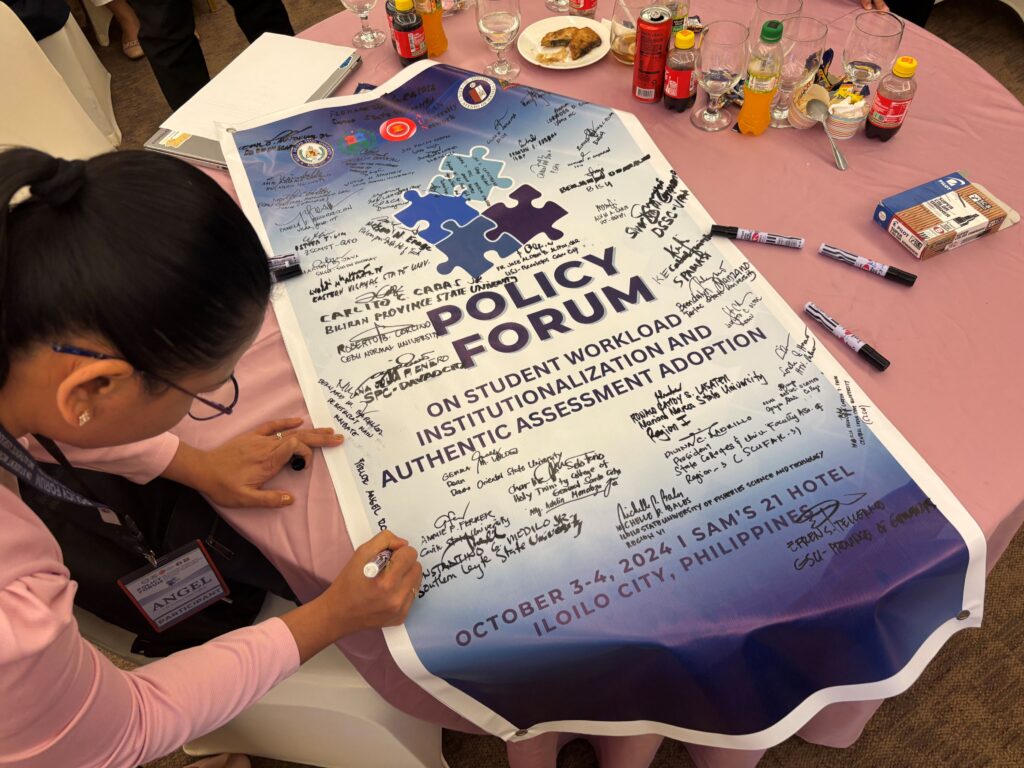
Find more information about the CALOHEA project and its Key Recognition Mechanisms at https://calohea.org/.
The introduction video to the CALOHEA is now available on the AUN Secretariat Youtube Channel!

